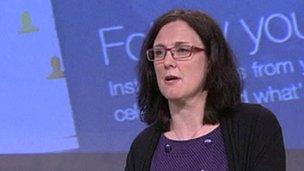Cybercrime: EU's 'best brains' to be enlisted to fight
- Published

Commissioner Cecilia Malmstrom: Centre will attract "best brains" in EU
The European Commission has announced plans to set up a dedicated centre to fight cybercrime.
"[It] will bring together some of Europe's best brains in the field of cybercrime," said Cecilia Malmstrom, European Commissioner for Home Affairs, at a press conference in Brussels.
Based in The Hague, it will be housed alongside Europol, the pan-European police force.
The plan is for the centre to be up and running by January 2013.
It will be primarily focused on fighting credit card and bank fraud.
"As the e-economy grows at a fast pace, cybercrime is following suit," said Ms Malmstrom.
Cyber counter-attack
More than a third of the EU's 500 million citizens bank online, and an estimated $8tn (£5tn) changes hands globally each year in e-commerce, according to the Commission.
While acknowledging it is hard to put a figure on the total cost of cybercrime, Ms Malmstrom cited one study that estimated it to be $388bn a year worldwide.
"Up to 600,000 Facebook accounts are blocked every day, after various types of hacking attempts," she said.
"In 2009, over 6.7m distinct bot infected computers were detected."
The centre will provide logistical support for investigations and become a "focal point" for European-wide initiatives, Ms Malmstrom added.
Apart from its remit to fight fraud, the centre will also pay attention to social networks, online child sexual exploitation and cyber-attacks affecting "critical infrastructures".
However, the Commission said its remit would not extend to pursuing individual file sharers.